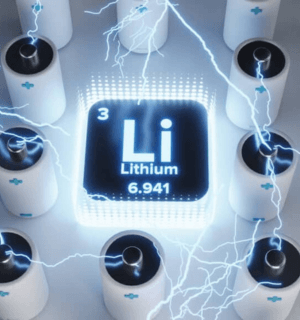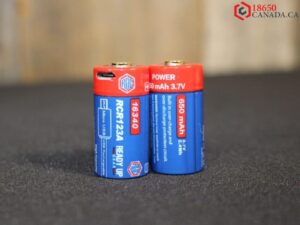Lithium-ion batteries have revolutionized the way we power our modern devices, from smartphones to electric vehicles. Their high energy density, long cycle life, and lightweight design make them a preferred choice in various applications. In this article, we will delve into the intricacies of lithium-ion batteries, uncovering their working principle, advantages, applications, challenges, and future prospects.
Unleashing the Power:
Exploring the Marvels of Lithium-ion Batteries is an article that dives into the intricacies of lithium-ion batteries, covering their working principle, advantages, applications, challenges, and future prospects.
The article highlights the high energy density, long cycle life, and lightweight design as key advantages of lithium-ion batteries, making them ideal for portable electronics, electric vehicles, and renewable energy storage.
It discusses challenges such as sensitivity to high temperatures and the environmental impact of these batteries, while also exploring recent developments, safety considerations, and comparisons with other battery technologies.
The article concludes by emphasizing the promising future of lithium-ion batteries and the importance of prioritizing safety, sustainability, and responsible resource management in their usage.
Lithium-Ion Batteries
Lithium-ion batteries are rechargeable energy storage devices that utilize the movement of lithium ions between electrodes to store and release electrical energy. They were first introduced commercially in the 1990s and quickly gained popularity due to their superior performance compared to traditional battery technologies.
The Working Principle of Lithium-Ion Batteries
Lithium-ion batteries consist of two main components: a positive electrode (cathode) and a negative electrode (anode) separated by an electrolyte. During charging, lithium ions move from the positive electrode to the negative electrode through the electrolyte and are stored in the anode material. When the battery is discharged, the ions flow back to the cathode, freeing electric electricity.

Advantages of Lithium-Ion Batteries
Lithium-ion batteries offer several advantages over other battery technologies. Firstly, they have a high energy density, meaning they can store a significant amount of energy in a compact size. This makes them ideal for portable electronics where space is limited. Additionally, lithium-ion batteries have a long cycle life, meaning they can undergo a large number of charge and discharge cycles before their capacity significantly degrades. They also exhibit a low self-discharge rate, allowing them to retain their charge for extended periods.
Applications of Lithium-Ion Batteries
Portable Electronics
Lithium-ion batteries have revolutionized the portable electronics industry. From smartphones and laptops to tablets and smartwatches, these batteries provide the necessary power to keep our devices running for extended periods. The lightweight nature of lithium-ion batteries also makes them suitable for wearable devices.
Electric Vehicles
The shift towards electric vehicles (EVs) is largely fueled by lithium-ion batteries. These batteries offer the high energy density required to power vehicles efficiently, allowing for longer driving ranges. With advancements in technology, the charging times for EVs have also significantly decreased, making them a viable alternative to traditional internal combustion engine vehicles.
Renewable Energy Storage
Lithium-ion batteries play a critical function in storing electricity generated from renewable resources which include solar and wind. They help deal with the intermittent nature of renewable electricity by storing excess power throughout peak generation and releasing it at some stage in durations of low technology. This ensures a steady and reliable power supply, reducing reliance on fossil fuels.
Challenges And Limitations of Lithium-Ion Batteries
While lithium-ion batteries offer numerous advantages, they are not without challenges. One significant limitation is their sensitivity to high temperatures, which can lead to performance degradation and safety concerns. Additionally, the cost of production and raw materials, such as cobalt, can impact their affordability and scalability.
Recent Developments in Lithium-Ion Battery Technology
Researchers and manufacturers continue to make advancements in lithium-ion battery technology to overcome existing limitations. Some notable developments include the use of alternative materials like solid-state electrolytes, which enhance safety and energy density. Moreover, efforts are being made to reduce the reliance on critical resources like cobalt and improve the recyclability of lithium-ion batteries.
Safety Considerations With Lithium-Ion Batteries
Safety is of paramount importance when dealing with lithium-ion batteries. The potential for thermal runaway and fire incidents necessitates strict regulations and guidelines for their manufacturing, transportation, and usage. Proper storage, handling, and disposal practices are crucial to minimize risks and ensure the safe operation of lithium-ion batteries.
Environmental Impact of Lithium-Ion Batteries
As the demand for lithium-ion batteries continues to rise, it is essential to consider their environmental impact. The extraction and processing of raw materials, as well as the disposal of used batteries, can have adverse effects on ecosystems and human health. However, efforts are being made to develop more sustainable battery recycling methods and explore greener alternatives to reduce their overall environmental footprint.
Comparison With Other Battery Technologies
Lithium-ion batteries have established themselves as the leading rechargeable battery technology. But, they are now not the only option available. Other battery technologies like nickel-metal hydride (NiMH) and solid-state batteries have their own advantages and limitations. Comparing these technologies helps in determining the most suitable option for specific applications.
Future Prospects of Lithium-Ion Batteries
The future of lithium-ion batteries looks promising. Ongoing research aims to improve their energy density, safety, and sustainability. With the increasing demand for electric vehicles, renewable energy storage, and portable electronics, lithium-ion batteries will continue to play a crucial role in shaping our energy landscape.
The Marvels of LISHEN 21700 and MOLICEL/NPE INR-18650-P26A Lithium-Ion Batteries
When it comes to exploring the marvels of lithium-ion batteries, the LISHEN 21700 and MOLICEL/NPE INR-18650-P26A stand out as exceptional powerhouses. The LISHEN 21700 battery packs a punch with its high capacity and energy output, making it a reliable choice for various applications.
Whether it’s powering electric vehicles or supporting renewable energy systems, the LISHEN 21700 excels in delivering sustained performance. On the other hand, the MOLICEL/NPE INR-18650-P26A battery offers impressive power and reliability for portable electronics and energy storage solutions.
With its exceptional discharge capabilities and long cycle life, it provides the durability and efficiency needed for demanding tasks. Unleash the true power of lithium-ion technology with the versatile LISHEN 21700 and MOLICEL/NPE INR-18650-P26A batteries, and embrace a future powered by innovation.
Closing
Lithium-ion batteries have revolutionized the world of portable strength. Their high energy density, long cycle life, and widespread applications make them indispensable in our modern lives. While they face challenges related to safety, cost, and environmental impact, ongoing advancements in technology are paving the way for more efficient and sustainable lithium-ion batteries. As we continue to explore the marvels of this technology, it is important to prioritize safety, environmental stewardship, and responsible resource management.
FAQs
Are lithium-Ion Batteries the Same As Lithium Batteries?
No, lithium-ion batteries and lithium batteries are not the same. Lithium batteries are primary (non-rechargeable) batteries, whereas lithium-ion batteries are rechargeable and offer superior performance and energy density.
How Long Do Lithium-Ion Batteries Last?
The lifespan of lithium-ion batteries varies depending on factors such as usage, operating conditions, and quality. Generally, they can last for several years with proper care, typically retaining around 80% of their original capacity after 300-500 charge cycles.
Can Lithium-Ion Batteries Explode?
While the risk of explosion is extremely low, mishandling or misuse of lithium-ion batteries can lead to thermal runaway and potentially result in fires. It is important to follow recommended safety guidelines to minimize such risks.
Can I Overcharge a Lithium-Ion Battery?
Overcharging a lithium-ion battery can lead to performance degradation and safety risks. Most modern devices and chargers have built-in mechanisms to prevent overcharging by automatically stopping the charging process when the battery is fully charged.
How Should I Dispose of Used Lithium-Ion Batteries?
Lithium-ion batteries should not be disposed of in regular waste. Many countries have designated recycling centers or collection points where used batteries can be safely dropped off. Proper recycling helps.

